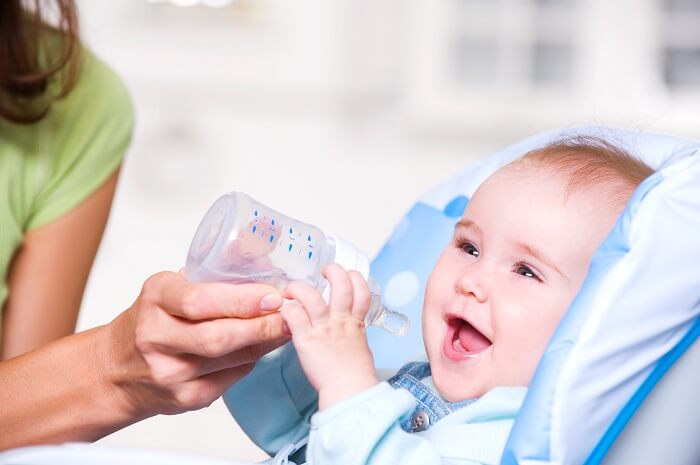Understanding Newborn Hydration: When Should I Give My Newborn Water?
Welcoming a newborn into the world comes with a multitude of responsibilities, including ensuring proper nutrition and hydration. As a parent, it is crucial to understand the unique needs of your newborn, especially when it comes to their hydration requirements. One common question that often arises is, "When should I give my newborn water?" This article aims to provide you with comprehensive information on newborn hydration and address the appropriate time to introduce water into their diet.
1. The Importance of Hydration for Newborns
Hydration plays a vital role in maintaining your newborn's overall health and well-being. Adequate hydration supports the body's essential functions, including digestion, temperature regulation, and the overall development of organs and tissues.
2. Exclusive Breastfeeding or Formula Feeding
For the first six months of a newborn's life, exclusive breastfeeding or formula feeding provides all the necessary hydration. Breast milk or formula is designed to fulfill both the nutritional and hydration needs of newborns. These sources contain a high water content, making additional water unnecessary.
3. Water Intake and Newborns
Newborns have unique fluid requirements that differ from older children and adults. Their kidneys are not fully developed, and their tiny bodies are efficient at maintaining the appropriate balance of fluids. Introducing water too early or in excessive amounts may disrupt this delicate balance.
4. When Can I Give My Newborn Water?
In general, newborns do not need supplemental water before they start solid foods, which is typically around 6 months of age. Until then, breast milk or formula provides sufficient hydration. However, certain situations may call for limited water intake:
Extremely hot weather: During exceptionally hot climates, you can offer small amounts of cooled, boiled water to prevent dehydration. Consult with your pediatrician for specific recommendations.
Medication administration: In some cases, healthcare professionals may advise diluting medications with water for newborns. Always follow the guidance of your healthcare provider.
Rehydration after illness: If your newborn experiences diarrhea or vomiting, leading to dehydration, your healthcare provider may recommend giving small amounts of oral rehydration solution (ORS) to restore hydration levels.
5. Signs of Dehydration in Newborns
It's essential to be vigilant for signs of dehydration in newborns. Contact your healthcare provider immediately if you notice any of the following symptoms:
- Decreased urine output or dark-colored urine
- Dry mouth and lips
- Lethargy or excessive sleepiness
- Sunken fontanelle (soft spot on the baby's head)
- Weight loss or failure to gain weight
FAQs:
Q1. Can I give my newborn water to quench their thirst?
No, it is not necessary to offer water to newborns to quench their thirst. Breast milk or formula provides adequate hydration to meet their needs.
Q2. How much water should I give my newborn during hot weather?
If your newborn is under six months old, you should consult your pediatrician for guidance on the appropriate amount of water during hot weather.
Q3. Can I give my newborn juice instead of water?
It is generally not recommended to offer juice to newborns, as it can interfere with their nutritional needs and digestion. Stick to breast milk or formula until they are ready for solid foods.
Q4. What if my newborn refuses to drink water when recommended?
If your newborn refuses to drink water during situations where it is advised, consult with your pediatrician for further evaluation and guidance.
Know more
Understanding the nuances of newborn hydration is crucial for every parent. While breast milk or formula meets the hydration requirements of newborns, certain circumstances may call for limited water intake. It is vital to be mindful of the appropriate timing and situations when giving water to your newborn. Always consult with your pediatrician for specific recommendations, especially during hot weather or instances of illness.
Remember, exclusive breastfeeding or formula feeding provides the necessary hydration for your newborn's first six months. Introducing water too early or in excessive amounts may interfere with their delicate fluid balance. Keep a watchful eye for signs of dehydration and promptly seek medical attention if you notice any concerning symptoms.
As a parent, your primary focus should be on ensuring your newborn's overall health and well-being. By understanding the importance of hydration and the appropriate time to introduce water, you can provide your little one with the best possible start in life. Cherish these early moments and consult with your healthcare provider for personalized advice that suits your newborn's unique needs.
In conclusion, the question of when to give your newborn water is best answered by following the guidance of healthcare professionals. While water is generally unnecessary for newborns before the introduction of solid foods, there are specific situations where limited water intake may be recommended. Stay informed, observe your newborn for signs of dehydration, and trust the expertise of your pediatrician. Ensuring your little one remains properly hydrated is an essential part of their overall care and development.


